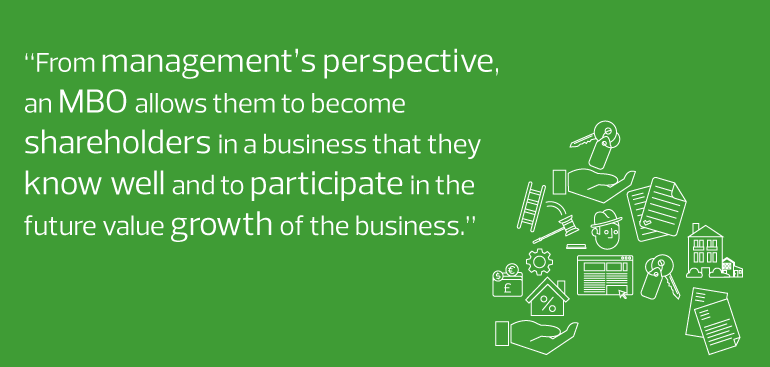
For the owner of a construction company planning to sell or set in motion a succession plan, timing is everything. With the improvement in the economy in recent years and increased activity in the construction sector, many owners are finding that they are now in a better position to achieve a successful hand over. This could be parents passing the company to their children, or a management buy-out (MBO), where the current management team within a company want to take either full or part ownership of a business.
There has been a notable increase in MBO transactions in recent years, buoyed by an increase of the availability of financing in the market, including financing from private equity firms who have been very active in the Irish market.
An MBO can be an appealing option where family succession is not feasible and there is a desire on the part of the owner to preserve continuity by transitioning the ownership of the business to the company's own management and executives.
From the owner’s perspective, they can extract some or all of the value from the business. If they want to retain an interest in the business, then they can benefit from the incentivisation of the management team to take the business to the next level. From management’s perspective, an MBO allows them to become shareholders in a business that they know well and to participate in the future value growth of the business.
Assuming an MBO is pursued, one of the first questions that owners and management teams ask is how it will be financed. Management team rarely have the financial capacity to fund MBO transactions through their own personal resources. In addition, access to financing has been a major challenge for construction companies in recent years.
The good news is there are several options in terms of structuring an MBO transaction and many financing alternatives are available in the form of equity, debt and a combination of both.
The financing market for Management Buy-Outs (MBOs) has grown and developed in recent years, with an increase in both the number of finance providers and the availability of financing.
Before approaching any finance provider, preparation is key. It is important to have a strategy and business plan in place with robust financial projections. All finance providers will look at the quality and depth of the management team and like to back companies with good cashflows, a clear strategy and strong growth prospects. Funders will want to carry out due diligence on the company so preparation for that due diligence process can greatly facilitate a successful transaction. Being prepared and identifying potential pitfalls early to ensure they are addressed in advance of a third-party review will help to reduce the exposure to potential issues.
The valuation of the business is important for a number of reasons, including ascertaining how much financing is required. It is also one of the key factors in determining if an MBO will be successful. This is because the transaction value needs to be sufficiently attractive to the seller, while at the same time the price needs to make sense for the management team and their financial sponsors to acquire the business and generate an adequate return on their investment.
Tax planning is another important component of preparation so that a transaction is completed in the most tax efficient manner possible from the perspective of both the seller, the buyer and funder.
The funding structure that is ultimately most appropriate for an MBO varies from company to company and also depends on other factors such as the risk tolerance of the management team.
Debt, either from banks or alternative debt providers, is one obvious funding option. The debt capacity of the company is determined by the cashflow characteristics of the business and also by how much debt the management team are prepared to take on.
Typically however an MBO will also require an equity component to the funding structure. This is particularly true of companies in the construction sector where cashflow characteristics can make debt financing more challenging. One source of equity, private equity firms have been increasingly active in the market in recent years. They typically invest in companies with strong growth potential and usually seek to exit their investment within a defined time period.
In summary, current market conditions have been and continue to be favourable for MBOs in the construction sector and if there is an appetite for ownership transition, from the perspective of both owners and management teams it is an option worth exploring.
As seen in the Construction Industry Federation's Construction Magazine Top 50
